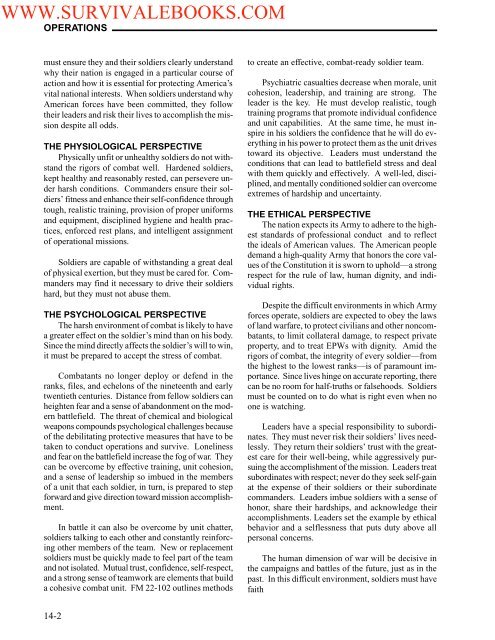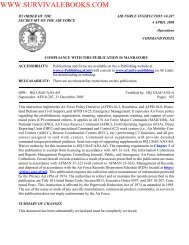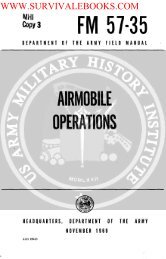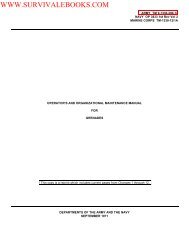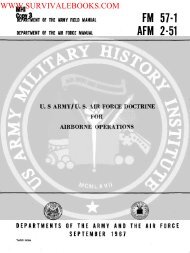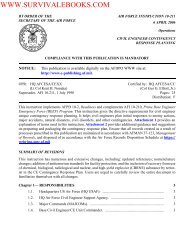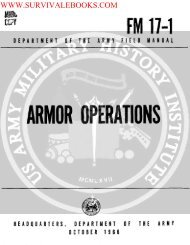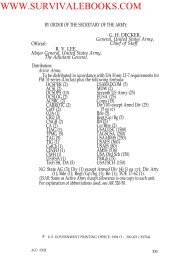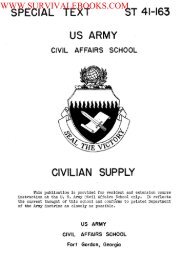FM 100-5 Operations - Survival Ebooks Military Manuals Survival ...
FM 100-5 Operations - Survival Ebooks Military Manuals Survival ...
FM 100-5 Operations - Survival Ebooks Military Manuals Survival ...
Create successful ePaper yourself
Turn your PDF publications into a flip-book with our unique Google optimized e-Paper software.
WWW.SURVIVALEBOOKS.COMOPERATIONSmust ensure they and their soldiers clearly understandwhy their nation is engaged in a particular course ofaction and how it is essential for protecting America’svital national interests. When soldiers understand whyAmerican forces have been committed, they followtheir leaders and risk their lives to accomplish the missiondespite all odds.THE PHYSIOLOGICAL PERSPECTIVEPhysically unfit or unhealthy soldiers do not withstandthe rigors of combat well. Hardened soldiers,kept healthy and reasonably rested, can persevere underharsh conditions. Commanders ensure their soldiers’fitness and enhance their self-confidence throughtough, realistic training, provision of proper uniformsand equipment, disciplined hygiene and health practices,enforced rest plans, and intelligent assignmentof operational missions.Soldiers are capable of withstanding a great dealof physical exertion, but they must be cared for. Commandersmay find it necessary to drive their soldiershard, but they must not abuse them.THE PSYCHOLOGICAL PERSPECTIVEThe harsh environment of combat is likely to havea greater effect on the soldier’s mind than on his body.Since the mind directly affects the soldier’s will to win,it must be prepared to accept the stress of combat.Combatants no longer deploy or defend in theranks, files, and echelons of the nineteenth and earlytwentieth centuries. Distance from fellow soldiers canheighten fear and a sense of abandonment on the modernbattlefield. The threat of chemical and biologicalweapons compounds psychological challenges becauseof the debilitating protective measures that have to betaken to conduct operations and survive. Lonelinessand fear on the battlefield increase the fog of war. Theycan be overcome by effective training, unit cohesion,and a sense of leadership so imbued in the membersof a unit that each soldier, in turn, is prepared to stepforward and give direction toward mission accomplishment.In battle it can also be overcome by unit chatter,soldiers talking to each other and constantly reinforcingother members of the team. New or replacementsoldiers must be quickly made to feel part of the teamand not isolated. Mutual trust, confidence, self-respect,and a strong sense of teamwork are elements that builda cohesive combat unit. <strong>FM</strong> 22-102 outlines methodsto create an effective, combat-ready soldier team.Psychiatric casualties decrease when morale, unitcohesion, leadership, and training are strong. Theleader is the key. He must develop realistic, toughtraining programs that promote individual confidenceand unit capabilities. At the same time, he must inspirein his soldiers the confidence that he will do everythingin his power to protect them as the unit drivestoward its objective. Leaders must understand theconditions that can lead to battlefield stress and dealwith them quickly and effectively. A well-led, disciplined,and mentally conditioned soldier can overcomeextremes of hardship and uncertainty.THE ETHICAL PERSPECTIVEThe nation expects its Army to adhere to the higheststandards of professional conduct and to reflectthe ideals of American values. The American peopledemand a high-quality Army that honors the core valuesof the Constitution it is sworn to uphold—a strongrespect for the rule of law, human dignity, and individualrights.Despite the difficult environments in which Armyforces operate, soldiers are expected to obey the lawsof land warfare, to protect civilians and other noncombatants,to limit collateral damage, to respect privateproperty, and to treat EPWs with dignity. Amid therigors of combat, the integrity of every soldier—fromthe highest to the lowest ranks—is of paramount importance.Since lives hinge on accurate reporting, therecan be no room for half-truths or falsehoods. Soldiersmust be counted on to do what is right even when noone is watching.Leaders have a special responsibility to subordinates.They must never risk their soldiers’ lives needlessly.They return their soldiers’ trust with the greatestcare for their well-being, while aggressively pursuingthe accomplishment of the mission. Leaders treatsubordinates with respect; never do they seek self-gainat the expense of their soldiers or their subordinatecommanders. Leaders imbue soldiers with a sense ofhonor, share their hardships, and acknowledge theiraccomplishments. Leaders set the example by ethicalbehavior and a selflessness that puts duty above allpersonal concerns.The human dimension of war will be decisive inthe campaigns and battles of the future, just as in thepast. In this difficult environment, soldiers must havefaith14-2


